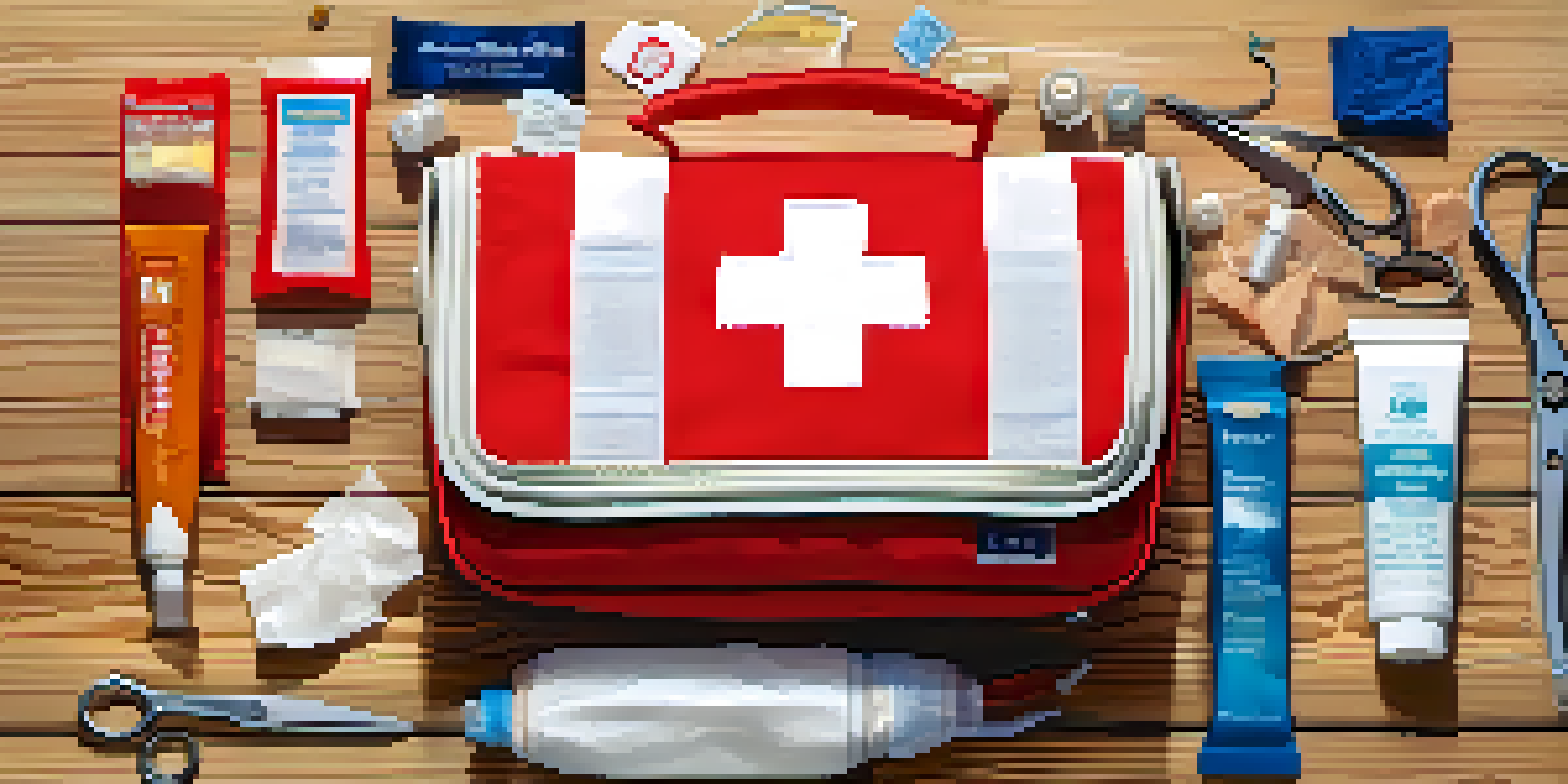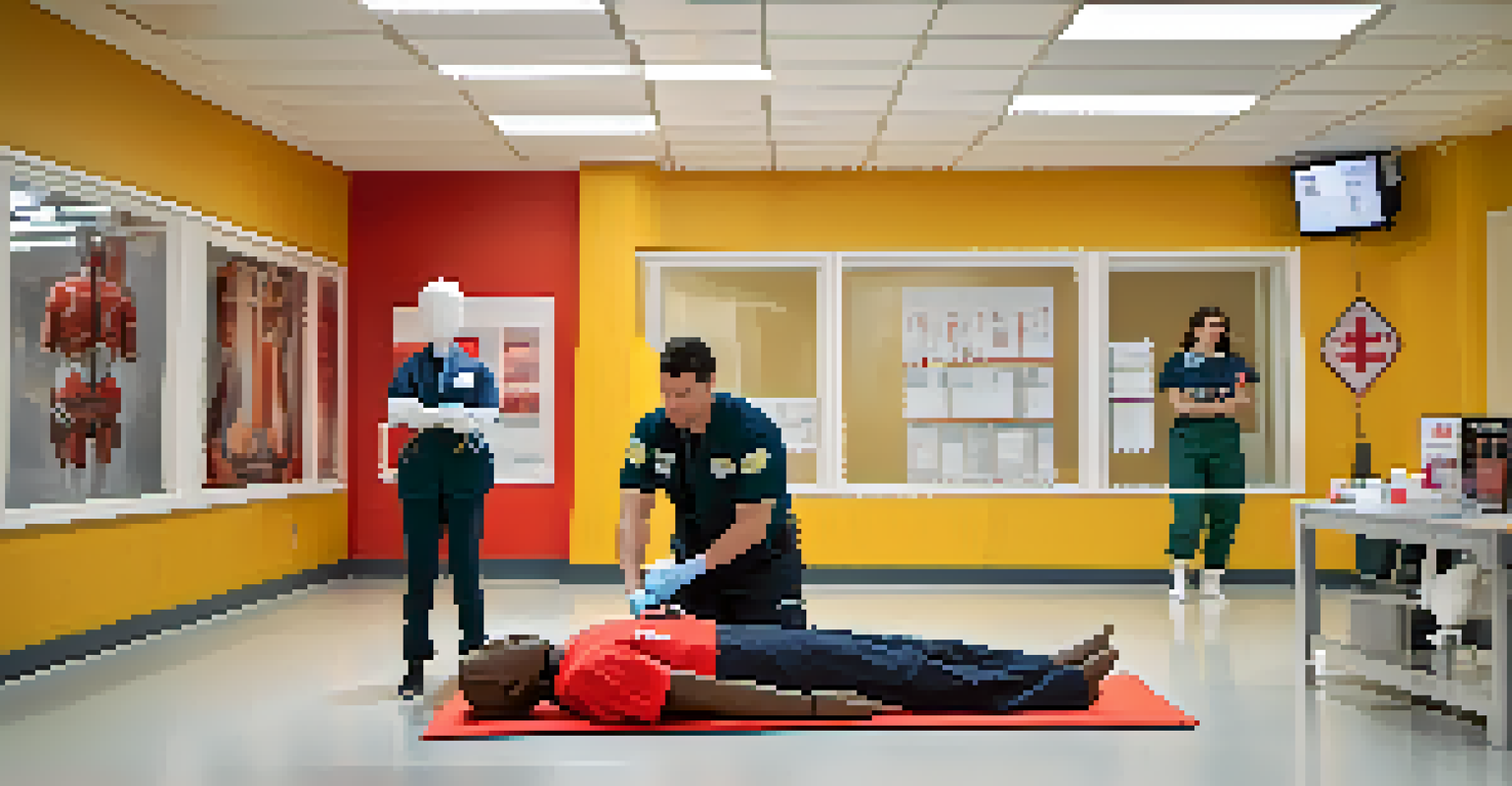First Aid and Self Defense: A Comprehensive Training Guide

Understanding the Basics of First Aid
First aid is the immediate care given to someone who is injured or ill until professional help arrives. This can include everything from cleaning a wound to performing CPR. Knowing basic first aid can make all the difference in an emergency situation, as it can stabilize a person's condition and even save lives.
The best way to predict your future is to create it.
It's important to familiarize yourself with common first aid techniques, such as how to treat burns, cuts, and sprains. Many people find that taking a certified first aid course helps build their confidence and knowledge in handling emergencies. Additionally, having a well-stocked first aid kit at home and in your car can prepare you for unexpected incidents.
Always remember that first aid is about assessing the situation, ensuring safety, and providing care as needed. It's not just about treating injuries; it's about being an informed and caring presence in a crisis. With a little training and preparation, you can be ready to help when it matters most.
The Importance of CPR and Rescue Breathing
Cardiopulmonary resuscitation (CPR) is a lifesaving technique used in emergencies when someone's heartbeat or breathing has stopped. It involves chest compressions and rescue breaths, which help maintain blood flow and oxygenation until professional help can take over. Learning CPR can empower you to act quickly in critical situations.

Many organizations offer CPR courses that teach the proper techniques and timing for administering compressions and breaths. Practicing these skills can make you more comfortable and effective when it counts. Moreover, knowing how to use an Automated External Defibrillator (AED) in conjunction with CPR can significantly increase the chances of survival.
First Aid Saves Lives
Knowing basic first aid techniques can stabilize a person's condition and even save lives in emergencies.
In a situation where someone collapses or is unresponsive, every second counts. Being trained in CPR means you can step in confidently, potentially saving a life. It's a powerful reminder of how vital these skills are to our communities.
Identifying Common Medical Emergencies
Recognizing the signs of common medical emergencies is crucial for effective first aid. Conditions like heart attacks, strokes, and allergic reactions can escalate quickly if not addressed promptly. Knowing the symptoms, such as chest pain for heart attacks or facial drooping for strokes, can help you take immediate action.
In any emergency, the first thing you do is to assess the situation before taking action.
In many cases, the difference between a positive outcome and a tragic one lies in how quickly help is summoned. For instance, if someone shows signs of anaphylaxis, administering an epinephrine auto-injector can be lifesaving. Being aware of these emergencies not only helps you assist others but also encourages you to advocate for your own health.
By familiarizing yourself with these conditions and their symptoms, you can act effectively and calmly in high-pressure situations. This preparedness can make a significant impact on the outcome of an emergency.
Self-Defense Basics: Protecting Yourself
Self-defense is about more than just physical techniques; it's about awareness and prevention. Understanding your surroundings and recognizing potential threats can help you avoid dangerous situations altogether. A well-rounded self-defense strategy includes both mental preparedness and physical skills.
Self-defense classes teach a variety of techniques aimed at helping you escape dangerous encounters. These can include strikes, holds, and escapes from grabs, all designed to give you the upper hand in a threatening situation. Practicing these techniques regularly can build muscle memory, making you more instinctively prepared to react.
CPR is a Critical Skill
Learning CPR and how to use an AED can empower you to act swiftly in life-threatening situations.
Remember, the goal of self-defense is to create an opportunity to escape and seek safety. It's essential to stay calm and focused, as panic can cloud your judgment. With practice and awareness, you can enhance your confidence and ability to protect yourself.
Situational Awareness: A Key Self-Defense Skill
Situational awareness is the ability to perceive, understand, and react to your environment. By being aware of your surroundings, you can identify potential risks before they become threats. This skill is vital in self-defense, as it allows you to make informed decisions about your safety.
Practicing situational awareness means regularly scanning your environment and being mindful of people and their behaviors. For instance, if you notice someone following you or behaving suspiciously, you can take proactive measures to remove yourself from the situation. It's about being alert while still enjoying your surroundings.
Enhancing your situational awareness can significantly improve your chances of avoiding confrontation. This mental preparedness, combined with physical self-defense skills, creates a comprehensive approach to personal safety.
Legal Considerations in Self-Defense
Understanding the legal aspects of self-defense is essential for anyone considering physical self-defense training. Laws regarding self-defense can vary widely by location, and knowing your rights can help you make informed decisions. In general, self-defense is legally justified if you reasonably believe you are in imminent danger.
It's crucial to understand the difference between self-defense and retaliation. The law typically protects individuals who are acting to prevent harm, but using excessive force can lead to legal consequences. Learning about local self-defense laws can help you navigate these situations more confidently.
Situational Awareness Matters
Being aware of your surroundings helps you identify potential threats and enhances your personal safety.
Being educated on the legalities of self-defense not only protects you but also empowers you to act responsibly. This knowledge can provide peace of mind as you train and prepare to defend yourself if necessary.
Building Confidence Through Training
One of the most significant benefits of first aid and self-defense training is the boost in confidence it provides. Knowing that you possess the skills to handle emergencies or defend yourself can alleviate anxiety and foster a sense of empowerment. This confidence often extends beyond physical skills, influencing other areas of your life.
Participating in regular training sessions, whether for first aid or self-defense, can reinforce your knowledge and skills. As you practice, you may find that your reactions become more instinctive and your ability to remain calm under pressure improves. This growth can create a ripple effect, enhancing your overall well-being.

Ultimately, investing in your training is an investment in yourself. The confidence gained from mastering these skills can lead to a more proactive and engaged approach to life, making you feel more equipped to face challenges head-on.